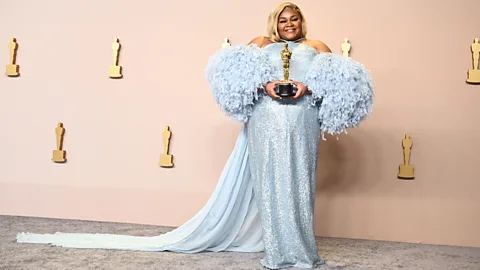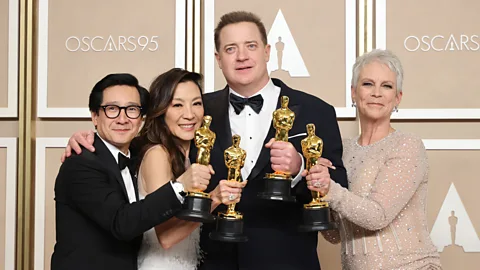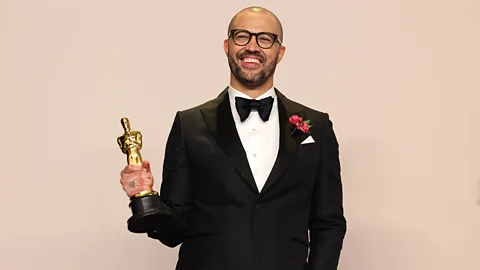9 Years after #OscarsSoWhite, here's what diversity looks like at the 2024 Academy Awards
 Getty Images
Getty Images2024 saw the very same number of acting nominees of colour as last year.
Nine years ago, thanks to the hashtag #OscarsSoWhite, the lack of diversity at the 2015 Academy Awards became one of the biggest takeaways of the evening. The hashtag, started by activist and writer April Reign, pointed out that, astonishingly, there were no people of colour nominated for acting roles that year. The following year, the same exact thing happened, prompting stars such as Jada Pinkett and Spike Lee to boycott the awards.
Realising there was an issue (or that the biggest stars in the industry were no longer going to stay quiet about it) the academy made efforts to diversify its membership. They set ambitious goals, and in 2020, announced they had exceeded them, doubling the number of female members, and tripling their members of colour. The Academy also announced new diversity-oriented changes this year. For example, to qualify for best picture nomination, films will have to meet diversity and inclusion standards. Among them is the rule that at least one of the lead actors or significant supporting actors is from an underrepresented racial or ethnic group in a specific country or territory of production.
Still, when it comes to nominations for people of colour, change has been slower to unfurl, though some notable nominations and wins have taken place. In 2019, Spike Lee received an award for best adapted screenplay for BlacKkKlansman. And in 2020, Bong Joon-ho took home the best director award for Parasite, making a memorable speech about subtitles. Last year, Angela Bassett was nominated for best supporting actress for her role in Wakanda Forever. And actors Michelle Yeoh, who is Malaysian, and Ke Huy Quan, who is Chinese, both took home trophies for Everything Everywhere All at Once.
More like this:
 Getty Images
Getty ImagesThis year, the 96th Oscars seemed to continue the trend of including more nominees of colour. Seven out of the 20 acting Oscar nominees were people of colour (the same number as last year). For each actor – Lily Gladstone, Danielle Brooks, Da’Vine Joy Randolph, America Ferrera, Colman Domingo, Sterling K. Brown and Jeffrey Wright – the nominations were their first.
And the very first win of the night went to an actor of colour. Da’Vine Joy Randolph won for best supporting actress in The Holdovers. In a powerful speech, she revealed that it was her mother who pointed her towards acting. "I thank you to all the people who have stepped in my path and been there for me, who have ushered me and guided me. I am so grateful to all you beautiful people out here. For so long, I've always wanted to be different, and now I realise I just need to be myself."
She also thanked an acting teacher who made sure she felt like she belonged. "Ron Van Lieu, I thank you. When I was the only Black girl in that class, when you saw me and you told me I was enough. And when I told you, I don't see myself, he said, 'That's fine. We're going to forge our own path. You're going to lay a trail for yourself.'"
In another win for diversity, director and writer Cord Jefferson won for best adapted screenplay for a story about a Black novelist realising that publishers only wanted stereotypical Black stories.
 Getty Images
Getty Images“There’s a Victor Hugo quote”, Jefferson said in his speech. “It’s ‘nothing is more powerful than an idea whose time has come’"...“Hopefully the lesson here", he continued, "is there’s an audience for things that are different and a story with Black characters that’s going to appeal to a lot of people doesn’t need to take place in a plantation, on a project, doesn’t need to have drug dealers or gang members in it. It’s important to show diversity within diversity. It’s important to me to recognise that no one Black person contains the totality of the Black experience.”
Other winners of colour at the Oscars included Hayao Miyazaki and Toshio Suzuki’s The Boy and the Heron, which won for best animated feature. Colman Domingo was the first Afro Latino nominated in the best actor category, as well. And while Lily Gladstone didn't take home the best actress award, her nomination – as the first Native American nominated for Best Actress for her turn as Mollie Burkhart in Martin Scorsese’s Killers of the Flower Moon – was historic.
Some have criticised the Academy for their efforts, asserting that they are merely performative. Spike Lee, for example, has said that while he thinks the Academy’s “heart is in the right place”, the standards contain “a lot of loopholes”. And it's hard to turn away from the fact that few of the night's biggest awards went to people of colour. Discussions on X (formerly Twitter) seem particularly focused on Emma Stone winning the best performance by a lead actress award over Lily Gladstone, as well as the film – a story about the murders of Osage members in 1920s Oklahoma – having 10 nominations and no wins.
Still, the 2024 Oscars weren't quite so white as they once were – thanks, in major part, to a little hashtag that became a movement.
If you liked this story, sign up for The Essential List newsletter – a handpicked selection of features, videos and can't-miss news delivered to your inbox every Friday.
If you would like to comment on this story or anything else you have seen on BBC Culture, head over to our Facebook page or message us on Twitter.
